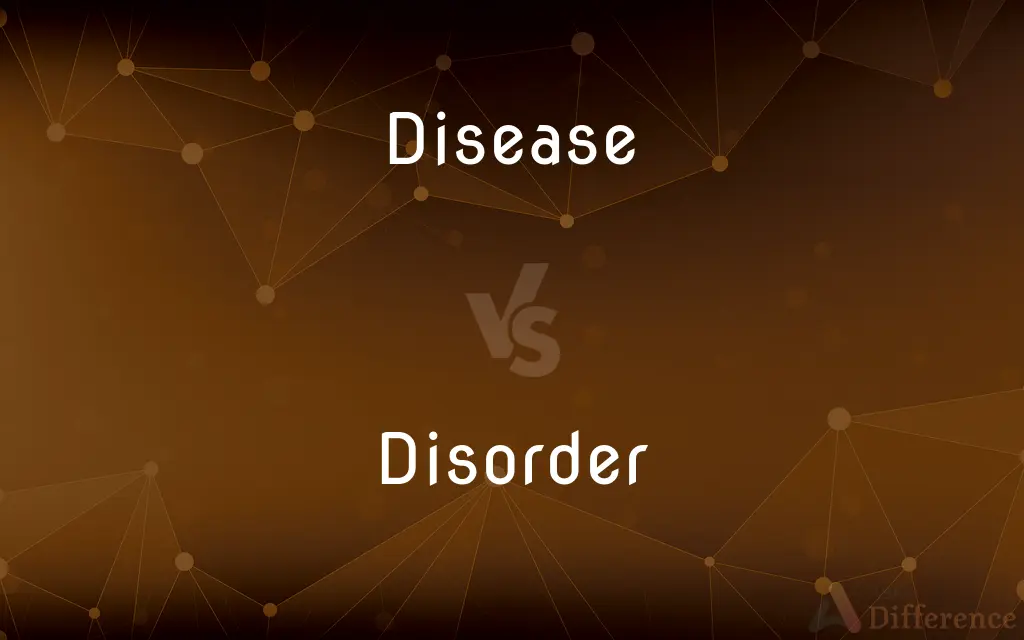Disease vs. Disorder — What's the Difference?
By Fiza Rafique & Maham Liaqat — Updated on April 14, 2024
Disease often refers to a specific medical condition with identifiable symptoms and causes, while a disorder generally denotes any disturbance of structure or function in the body, often with complex or unknown causes.

Difference Between Disease and Disorder
Table of Contents
ADVERTISEMENT
Key Differences
A disease is typically characterized by well-defined signs and symptoms that result from a specific pathological process. Whereas, a disorder encompasses a wider range of health issues that might not have a clear or identifiable cause.
Diseases can usually be diagnosed through specific tests and medical assessments, highlighting a particular abnormality or infection. On the other hand, disorders may be recognized through a broader array of diagnostics, often emphasizing a pattern of symptoms rather than a single cause.
Treatment for diseases generally targets the underlying cause, such as bacteria or viruses, to eradicate or manage the condition. Disorders, however, often require management strategies that address a spectrum of symptoms and support functional improvement.
Many diseases are acute, with a sudden onset of symptoms that respond to treatment over time. Disorders tend to have a more chronic nature, possibly affecting individuals throughout their lives without a definitive cure.
Preventative measures against diseases are often well established, including vaccines and lifestyle adjustments specific to the disease’s etiology. Disorders might not have clear preventative strategies, focusing more on managing or mitigating symptoms.
ADVERTISEMENT
Comparison Chart
Definition
A specific medical condition with clear causes.
A broad dysfunction with often complex or unknown causes.
Symptoms
Specific and identifiable.
Broad and variable.
Diagnosis
Through targeted tests pinpointing a cause.
Often through symptom patterns and extensive assessments.
Treatment
Targets and treats the underlying cause.
Focuses on symptom management and functional support.
Nature
Often acute and can be curable.
Generally chronic with ongoing management.
Compare with Definitions
Disease
A pathological condition of a body part, organ, or system.
Tuberculosis is a disease caused by bacteria affecting the lungs.
Disorder
Can affect mental or physical health, often chronic.
Bipolar disorder involves extreme mood swings.
Disease
An ailment with a specific set of symptoms and origin.
Lyme disease is caused by tick bites.
Disorder
Often has a complex set of symptoms with no single clear cause.
Autism is a disorder with a spectrum of symptoms.
Disease
A medical condition that can be diagnosed and treated.
Diabetes is a disease that affects how the body uses blood sugar.
Disorder
Diagnosis may involve a variety of tests and evaluations.
ADHD is diagnosed through behavior assessments.
Disease
Often associated with infections and can be contagious.
Chickenpox is a highly contagious viral disease.
Disorder
Treatment usually focuses on managing symptoms.
Medication and therapy are used to treat depressive disorders.
Disease
Typically has preventive measures and treatments.
Vaccination can prevent many infectious diseases.
Disorder
A disruption in the normal function of a body part or system.
Anxiety disorders affect how we feel and behave daily.
Disease
A disease is a particular abnormal condition that negatively affects the structure or function of all or part of an organism, and that is not due to any immediate external injury. Diseases are often known to be medical conditions that are associated with specific signs and symptoms.
Disorder
A lack of order or regular arrangement; confusion.
Disease
A disorder of structure or function in a human, animal, or plant, especially one that produces specific symptoms or that affects a specific location and is not simply a direct result of physical injury
Heart disease
Bacterial meningitis is quite a rare disease
Disorder
A breach of civic order or peace; a public disturbance.
Disease
An abnormal condition of a part, organ, or system of an organism resulting from various causes, such as infection, inflammation, environmental factors, or genetic defect, and characterized by an identifiable group of signs, symptoms, or both.
Disorder
A condition characterized by lack of normal functioning of physical or mental processes
Kidney disorders.
A psychiatric disorder.
Disease
A condition or tendency, as of society, regarded as abnormal and harmful.
Disorder
To throw into confusion or disarray.
Disease
(Obsolete) Lack of ease; trouble.
Disorder
To disturb the normal physical or mental health of; derange.
Disease
(medicine) An abnormal condition of a human, animal or plant that causes discomfort or dysfunction; distinct from injury insofar as the latter is usually instantaneously acquired.
The tomato plants had some kind of disease that left their leaves splotchy and fruit withered.
Disorder
Absence of order; state of not being arranged in an orderly manner.
After playing the children left the room in disorder.
Disease
(by extension) Any abnormal or harmful condition, as of society, people's attitudes, way of living etc.
Disorder
A disturbance of civic peace or of public order.
The class was thrown into disorder when the teacher left the room
The army tried to prevent disorder when claims the elections had been rigged grew stronger.
Disease
Lack of ease; uneasiness; trouble; vexation; disquiet.
Disorder
A physical or mental malfunction.
Bulimia is an eating disorder.
Disease
(obsolete) To cause unease; to annoy, irritate.
Disorder
(transitive) To throw into a state of disorder.
Disease
To infect with a disease.
Disorder
(transitive) To knock out of order or sequence.
Disease
Lack of ease; uneasiness; trouble; vexation; disquiet.
So all that night they passed in great disease.
To shield thee from diseases of the world.
Disorder
Want of order or regular disposition; lack of arrangement; confusion; disarray; as, the troops were thrown into disorder; the papers are in disorder.
Disease
An alteration in the state of the body or of some of its organs, interrupting or disturbing the performance of the vital functions, and causing or threatening pain and weakness; malady; affection; illness; sickness; disorder; - applied figuratively to the mind, to the moral character and habits, to institutions, the state, etc.
Diseases desperate grown,By desperate appliances are relieved.
The instability, injustice, and confusion introduced into the public counsels have, in truth, been the mortal diseases under which popular governments have every where perished.
Disorder
Neglect of order or system; irregularity.
From vulgar bounds with brave disorder part,And snatch a grace beyond the reach of art.
Disease
To deprive of ease; to disquiet; to trouble; to distress.
His double burden did him sore disease.
Disorder
Breach of public order; disturbance of the peace of society; tumult.
Disease
To derange the vital functions of; to afflict with disease or sickness; to disorder; - used almost exclusively in the participle diseased.
He was diseased in body and mind.
Disorder
Disturbance of the functions of the animal economy or of the soul; sickness; derangement.
Disease
An impairment of health or a condition of abnormal functioning
Disorder
To disturb the order of; to derange or disarrange; to throw into confusion; to confuse.
Disordering the whole frame or jurisprudence.
The burden . . . disordered the aids and auxiliary rafters into a common ruin.
Disorder
To disturb or interrupt the regular and natural functions of (either body or mind); to produce sickness or indisposition in; to discompose; to derange; as, to disorder the head or stomach.
A man whose judgment was so much disordered by party spirit.
Disorder
To depose from holy orders.
Disorder
Condition in which there is a disturbance of normal functioning;
The doctor prescribed some medicine for the disorder
Everyone gets stomach upsets from time to time
Disorder
A condition in which things are not in their expected places;
The files are in complete disorder
Disorder
A disturbance of the peace or of public order
Disorder
Disturb in mind or make uneasy or cause to be worried or alarmed;
She was rather perturbed by the news that her father was seriously ill
Disorder
Bring disorder to
Common Curiosities
Can a disorder develop into a disease?
Some disorders may evolve into more definable diseases as understanding and diagnostics improve, but typically they remain separate classifications.
Are disorders always chronic?
Many disorders are chronic, but not all; some may be episodic or situational.
What is the main difference between a disease and a disorder?
The main difference lies in their specificity; diseases have identifiable causes and symptoms, whereas disorders cover a wider range of symptoms with often unclear causes.
What is an example of a disease and a disorder?
An example of a disease is influenza, caused by the flu virus. An example of a disorder is irritable bowel syndrome, which affects digestive system function.
How are diseases diagnosed compared to disorders?
Diseases are diagnosed through specific tests targeting the underlying cause, while disorders may require a more holistic diagnostic approach.
Do disorders have genetic links like many diseases?
Many disorders, especially mental health and neurological disorders, have genetic components that influence their development, similar to many diseases that are linked to genetic predispositions.
How does public perception differ between diseases and disorders?
Diseases are often seen as medical conditions that are "acceptable" to discuss and treat, whereas disorders, particularly mental health disorders, can sometimes be stigmatized, leading to disparities in treatment and public sympathy.
Is treatment for diseases more effective than for disorders?
Treatment effectiveness can vary widely; diseases often respond well to treatments targeting specific causes, whereas treatments for disorders may focus more on symptom management and improving quality of life rather than cure.
Are all diseases contagious?
Not all diseases are contagious. Many diseases, such as genetic disorders or diseases caused by environmental factors, are not transmissible from person to person.
Can lifestyle changes prevent disorders the way they can prevent diseases?
While lifestyle changes can significantly impact the prevention and management of some diseases, their role in preventing disorders depends on the specific disorder. In many cases, lifestyle adjustments can help manage symptoms or reduce the severity of disorders.
Share Your Discovery

Previous Comparison
Gully vs. Ravine
Next Comparison
Jalapeno vs. CayenneAuthor Spotlight
Written by
Fiza RafiqueFiza Rafique is a skilled content writer at AskDifference.com, where she meticulously refines and enhances written pieces. Drawing from her vast editorial expertise, Fiza ensures clarity, accuracy, and precision in every article. Passionate about language, she continually seeks to elevate the quality of content for readers worldwide.
Co-written by
Maham Liaqat















































